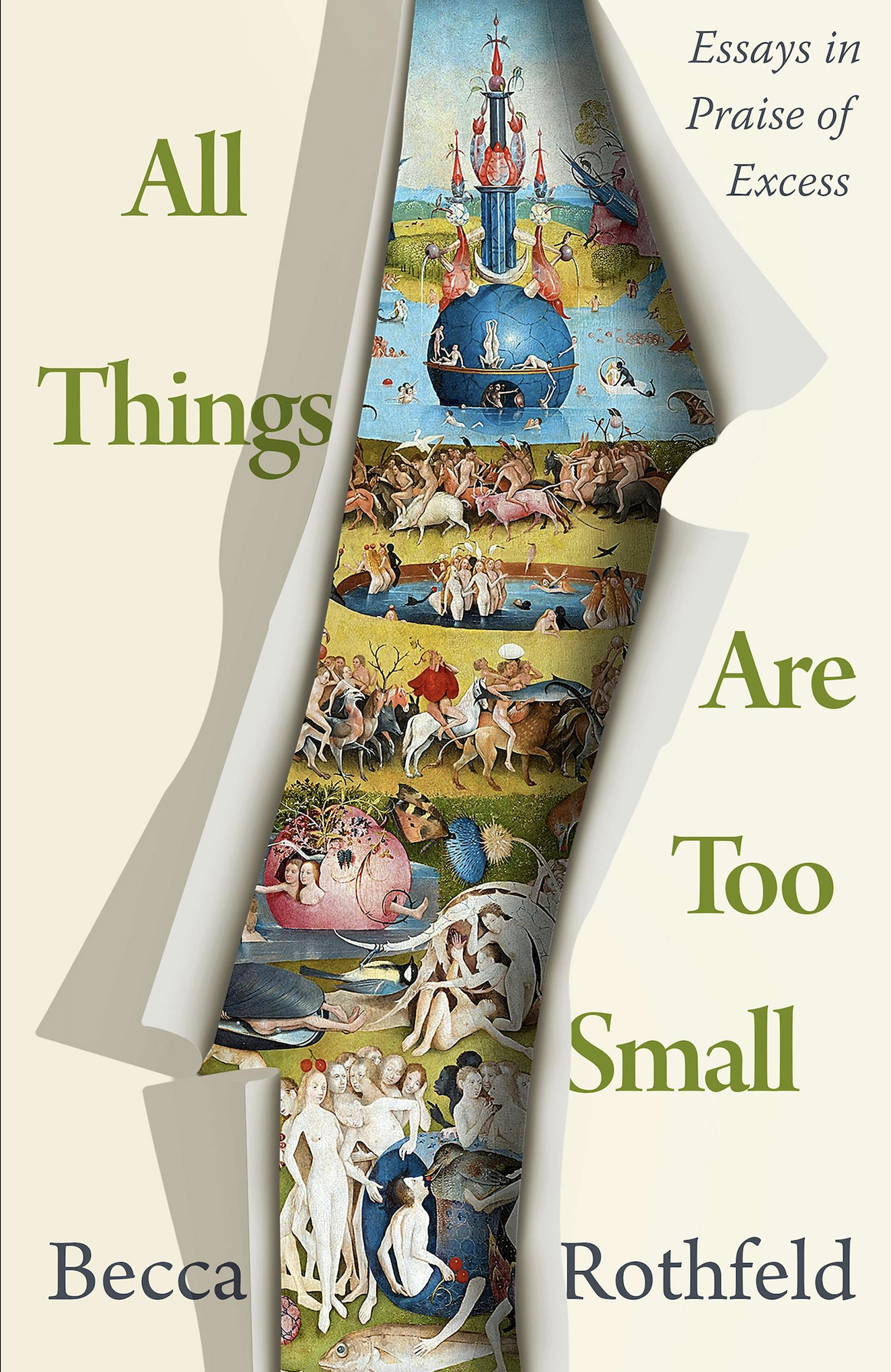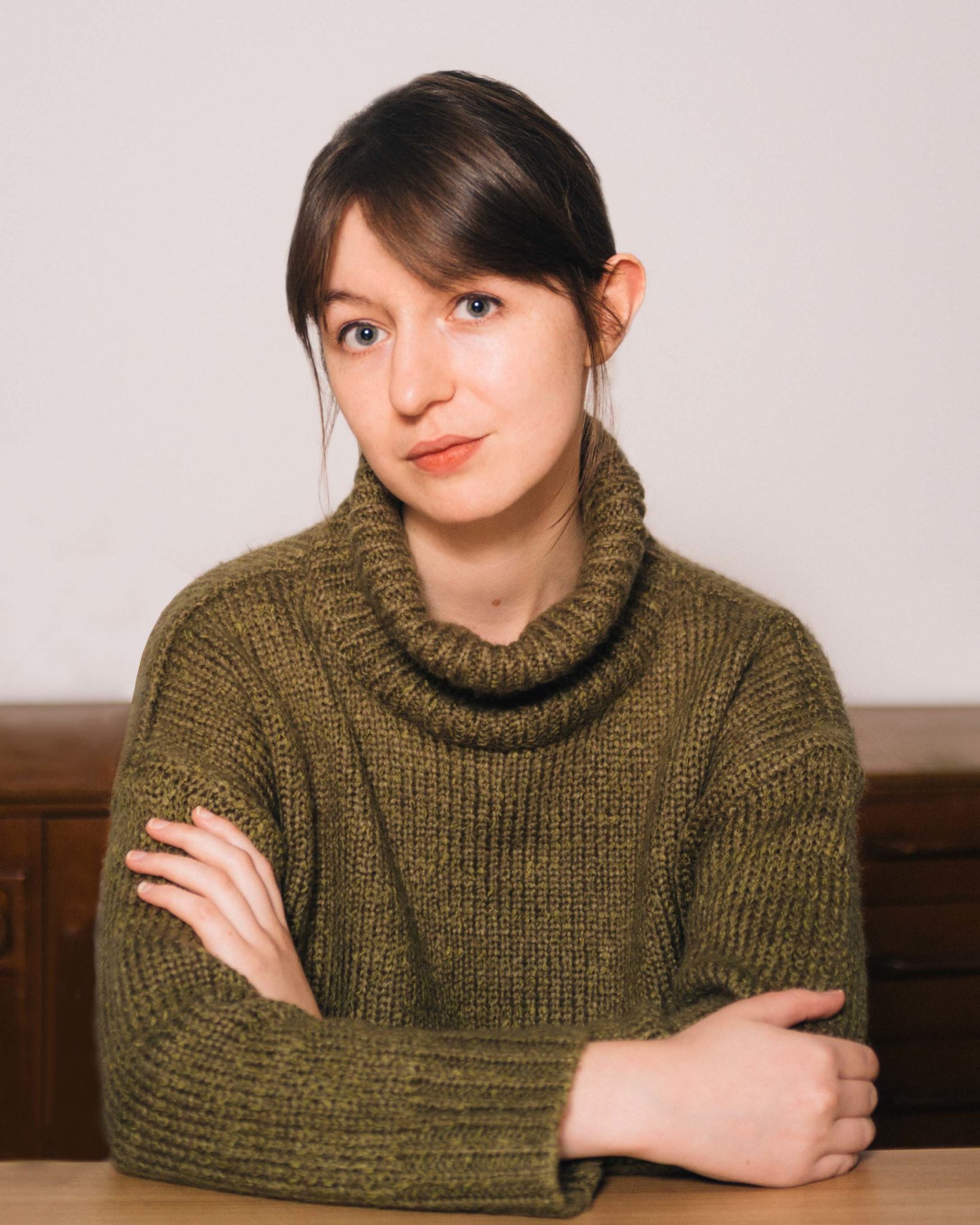- Culture
- 04 Jun 24

Becca Rothfeld is one of the most provocative young women writers on the scene. Here the Washington Post critic discusses mindfulness gurus, Sally Rooney, tradwives and her thought-provoking new essay collection All Things Are Too Small.
Becca Rothfeld, Washington Post book critic and self described “aggressively intellectual person”, has released a dazzling collection of essays, All Things Are Too Small: Essays In Praise Of Excess. It’s concerned with how the minimalist agenda has been pushed into our lives – and why Rothfeld thinks that’s a bad thing.
“Half of the essays are collected from things I had written previously, but the bulk are new,” she explains. “As I was writing essays for a variety of magazines and publications, I started to notice themes and recurring dissatisfactions. I noticed I was dissatisfied with the sanitisation of everything. Over and over, I found myself annoyed with novels that seemed a little bit sanitised and spare. I realised the underlying irritation was unified, and it was about their minimalist tendencies.”
Among Rothfeld’s other pet peeves are declutterers.
“Decluttering manuals claim they free you from being enslaved by your possessions,” she observes. “That’s the language they use a lot of the time. In fact, decluttering is also a way of making people totally accessible to the needs of their employers. It’s a way of making capital mobile. Another thing a lot of the decluttering books promise is that when you don’t have possessions, it’s great, because you can go anywhere at any time. You don’t need to be rooted to any particular place.
“I’m not a conspiracy theorist. I don’t think the writers of these books are in the employ of big companies trying to ensure the workforce is mobile. But I think the picture of human life being promoted in these books, is that you go around the world with your laptop to a bunch of cities that basically look exactly the same. You don’t have any reason to be in one place rather than anywhere else. I think that’s a hyper-capitalist vision, even if it’s not one in which you have a lot of physical items.”
Advertisement
 All Things Too Small by Becca Rothfeld
All Things Too Small by Becca RothfeldAnd we’re not just told to declutter our home, but our minds too.
“The examples they use are like, so-and-so is having a really bad time in the workplace, so what should they do?” says Rothfeld.
“Should they unionise?
No.
Should they go find a better job?
Advertisement
No.
Should they try get the minimum wage raised in their State?
No.
They should meditate, so they can be better reconciled to their working conditions. Mindfulness is a movement against the accumulation of mental detritus.
“Mindfulness gurus counsel people to get rid of their obsessions, and their angers and judgments. In fact, I think you should try to accumulate all of those things, because that’s what your personality consists of – your irritations, obsessions and fixations.”
Elsewhere, Rothfeld argues that even cultural criticism has succumbed to unwelcome minimalist tendencies. “I think this is true, at least on the American left,” says the author, who nonetheless considers herself to be on the left. “Because we have failed to obtain egalitarianism economically and politically, we turn to the sphere we do have some control over – the cultural sphere. We compensate for failing in the economic sphere by insisting that all artistic artefacts are created equal, and that it’s snobby to say certain movies are better than others.
“I think that yields a bit of anti-intellectualism. Maybe well meaning anti-intellectualism, because part of the motivation is a desire to secure equality in the one sphere we can. But I don’t think it’s helpful – in fact, I think it’s condescending. People deserve to have access to better art. We shouldn’t reconcile ourselves to Trolls 2.”
Advertisement
Given Rothfeld’s role as a literary critic, what does she think of our current biggest literary export, Sally Rooney?
“I think I wrote basically the first pretty negative review of Sally Rooney in the anglophone world,” she replies. “After I wrote that review, I kind of just stopped reading her books. I was like, ‘I’ve said what I have to say about Sally Rooney’, so I haven’t read Beautiful World, Where Are You, I haven’t read Intermezzo. It’s possible those books are amazing. I think she has great political convictions. Good for her. I am in agreement with the things she writes in her essays.
 Sally Rooney
Sally Rooney“I do find her first two books frustrating, because they embody a tension in contemporary life. On the one hand, people do want to be the best at things and recognised as better at things than other people. But on the other hand, people want to embody the virtues of egalitarianism, so they don’t want to proclaim themselves special.
“So I read Sally Rooney through the lens of 50 Shades Of Grey,” she continues. “Obviously, Sally Rooney’s books are better than 50 Shades Of Grey, but I do think the structure is not dissimilar in Normal People and Conversations With Friends. You have the female character consistently saying she is normal, but then every male character says, ‘You are the most beautiful and intelligent women I have ever met!’”
Rothfeld is a shrewd observational philosopher.
Advertisement
Rooney’s novels are clever and insightful, but the charge that they portray passive femininity is an interesting one. And unfortunately, passive femininity, in Rothfeld’s eyes, is making a comeback. The neo-traditional homestead influencers, who encourage women to leave corporate life and get back in the kitchen, are also on the rise. It’s a cohort who have become known as ‘tradwives’.
“It’s an image of purity,” says Rothfeld. “A false and nostalgic image of purity is being promoted by tradwives, and even people not going quite as far as advocating being tradwives. A lot of these people have softer, maybe more insidious critiques of the sexual revolution – they are kind of implying it would be better if we reverted to an older version of sexual and romantic norms.
“They are implicitly invoking this idea of purity that of course never existed, and if we were to obtain it, it would be horrible. I think there has been a backslide there. Those people have no idea what it would be like, but of course their lives are so curated. If you actually ran a homestead, you would be having a horrible time breaking your back and shovelling manure all the time.”
So what should readers expect from All Things Too Small?
“Insofar as the book has a message,” says Rothfeld, “one of them is that it’s really important to allow yourself to be shocked, and surprised and transformed, by encounters with other people and also with art. I don’t want people to know in advance what they should take from the book, because in a way, it’s a defence of being surprised. I hope people will be surprised when they read it.”
• All Things Are Too Small: Essays In Praise Of Excess is out now.










